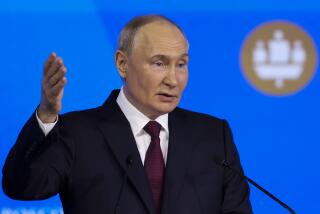Let’s Pay Attention
- Share via
Soviet leader Mikhail S. Gorbachev’s pronouncements this week were shrewdly calculated to put President Reagan on the defensive in advance of their November summit meeting in Geneva. The Administration would be wise, however, to take seriously the possibility that Gorbachev’s words may also have had a positive purpose.
In a meeting Tuesday with eight visiting U.S. senators, the Soviet leader reiterated that he is prepared to make “radical” proposals for reductions in offensive strategic weapons if the United States agrees to halt the “militarization of space” --a phrase that the Russians use to cover both the “Star Wars” anti-missile program and the testing of an anti-satellite weapon.
The meeting with the senators came as the immediate aftermath of a Gorbachev interview with Time magazine that was a masterpiece of public relations.
Although several of his statements were at odds with the factual record, he managed to paint himself as a leader who wants to end the arms race and has made several concrete attempts to enlist Washington’s cooperation in this enterprise--only to have his initiatives rejected as “propaganda.”
Gorbachev voiced a willingness to meet Washington “halfway” on the issues dividing the great powers. But he said that U.S.-Soviet relations were deteriorating, and he professed concern that the Administration was creating the conditions for a confrontational summit meeting.
The Soviet leader, it should be noted, has talked before about a willingness to propose “radical” cuts in offensive nuclear arms if Reagan would halt work on Star Wars. So far, however, Soviet representatives at the Geneva arms talks have presented no such proposal. And initially, at least, the Soviet press did not report this portion of Gorbachev’s remarks to the senators.
Gorbachev said that he was willing to allow research on anti-missile technology to continue, but he defined research in such a narrow way as to be unacceptable not only to Reagan but also to many of his critics who agree with the need for research on ballistic-missile defense as a hedge against Soviet abrogation of the 1972 ABM treaty.
Despite the obvious propaganda overtones of Gorbachev’s utterances this week, the White House was wise to reply in low-key, basically positive fashion. But a substantive follow-up is in order.
Arnold Horelick, director of the Rand-UCLA Center for the Study of Soviet Behavior, appropriately observed that, while Gorbachev’s words this week were clearly part of Moscow’s pre-summit maneuvering for advantage, they also suggested a real willingness to make a deal.
Gorbachev cannot seriously expect this Administration to write off Star Wars, including a tight but unenforceable restriction on missile-defense research, as a pre-condition to discussion of what “radical cuts” in offensive weapons he has in mind. But neither can Reagan really expect the Kremlin to show its hand on offensive-weapons reductions until it has reason to believe that the U.S. Star Wars and anti-satellite weapons are really on the bargaining table.
Knowledgeable sources say that there is reason to suspect that in return for restraints on the Star Wars program, the actual extent of which would have to be negotiated, the Soviet Union may be willing to accept really substantial cuts both in nuclear delivery vehicles and warheads. Achievement of that goal is definitely in the U.S. interest.
It’s worth noting that some of the most striking passages in Gorbachev’s interview with the Time editors deal with acknowledgement of Soviet economic problems, and his determination to deal with them.
Reagan should ponder the words of Jeane J. Kirkpatrick, former ambassador to the United Nations and a card-carrying hard-liner, in regard to the generational change in the Soviet ruling structure and the new leadership’s seeming interest in economic development.
For the first time in several decades, she told an interviewer, “there is a possibility that we have today in the Soviet Union a leadership group with somewhat different goals than their predecessors. It’s very important that we are sensitive to that possibility, and that we keep open that question.” It is indeed.
Reagan should halt the impending test of the U.S. anti-satellite weapon, or at the very least announce a postponement of any follow-up tests pending negotiations on the subject with Moscow. He should also announce the willingness of his Administration to get down to cases on the possible trade-offs between restraints on Star Wars research and strategic-weapons cuts.
If the President is unwilling to do these things, he should not be surprised if a growing number of people in the United States and Western Europe decide that he, more than Gorbachev, is standing in the way of progress on arms control.
More to Read
Get the L.A. Times Politics newsletter
Deeply reported insights into legislation, politics and policy from Sacramento, Washington and beyond. In your inbox twice per week.
You may occasionally receive promotional content from the Los Angeles Times.










